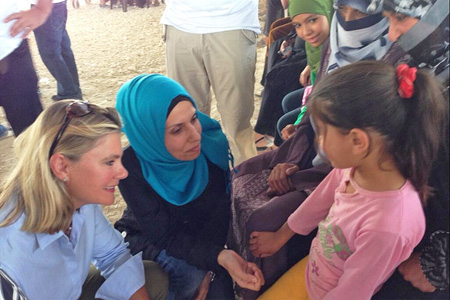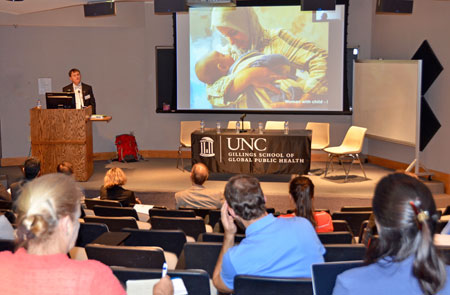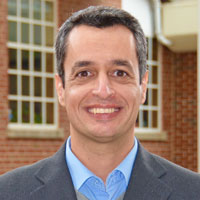School hosts learning symposium on conflict settings and complex emergencies
October 16, 2015
Globally, an estimated 60 million refugees are fleeing war-torn and conflict areas in 2015. Of these, more than 60 percent are uprooted forcibly and displaced within their own countries, according to the United Nations High Commission for Refugees (UNHCR).

United Kingdom’s International Development Secretary Justine Greening (left) talks with Syrian children at a UK-funded clinic in the Zaatari refugee camp, Jordan. Photo by Peter Millett/British Embassy, Jordan.
In this context, the UNC Gillings School of Global Public Health and its Gillings Global Gateway™ and Student Global Health Committee held an inaugural day-long learning symposium on Oct. 6 to explore the theme of “Global Public Health Opportunities and Challenges in Conflict Settings and Complex Emergencies.” Local and global experts shared experiences related to conflict and war, natural disaster response and epidemic disease, including last year’s Ebola outbreak in West Africa.
Randall Williams, MD, deputy secretary for health services in the North Carolina Department of Health and Human Services, presented the keynote address. Williams described his experiences in conflict zones including Iraq, Afghanistan and Libya. Four humanitarian experts then provided insights regarding their experiences in combating Ebola in Liberia and Sierra Leone. Other speakers virtually joined the conference to describe the current refugee crisis in Syria and Iraq.
Dilshad Jaff, MD, MPH, 2015 Gillings School alumnus, research adviser for conflict prevention and disaster preparedness at the Gillings Global Gateway and organizer of the symposium, led afternoon sessions, which included a discussion of the current refugee crises and a panel discussion. Panelists included Williams; Saye Dahn Baawo, MD, MPH, assistant minister for curative services in Liberia’s Ministry of Health and Social Welfare; Kevin Bialy, MAA, international program officer for the western hemisphere at the National Institutes of Health’s Fogarty International Center; Veronique Urbaniak, MD, MPH, head of sector (North Africa and Middle East) with the International Committee of the Red Cross, in Geneva; and Gavin Smith, PhD, research professor of city and regional planning at UNC-Chapel Hill and director of UNC’s Homeland Security Coastal Resilience Center of Excellence.
The symposium brought together professionals in the field and students interested in learning more about opportunities and challenges in complex emergencies and conflict settings.

Dr. Randall Williams presents the keynote address at the Gillings Global Gateway’s Learning Symposium on Conflict Settings and Complex Emergencies on Oct. 6.
“Our hope is to see complex emergencies getting more attention from public health students, researchers and experts,” said Jaff. “I am so glad that the Gillings Global Gateway was able to host this learning opportunity.”
“I found the panel discussion between professionals from the field and local experts in the audience enlightening,” said Courtney Hereford, a Master of Public Health and Master of Social Work dual-degree student. “This dynamic discourse exposed some of the most challenging needs and barriers in responding to the complex refugee crisis in Europe and Ebola outbreak in Africa, while bridging these contexts to our realities here in the Triangle [area of N.C.].”
Attendees gathered after the presentations to meet and network with the speakers and other students and faculty members from the Gillings School, other UNC health affairs schools, and other Triangle universities.
“After attending the symposium I want to focus on the health-delivery issues that arise out of conflict zones,” said Meagan Clawar, a junior Bachelor of Science in Public Health student in health policy and management.
Jim Herrington, PhD, executive director of the Gillings Global Gateway, said that symposium leaders were satisfied that their goals for the symposium had been achieved.
“The symposium provided attendees with an updated overview of and insights into public health in conflict settings and complex emergencies,” he said. “It also demonstrated the current opportunities, challenges, tools, limitations and ethical issues in these settings.”
Gillings School of Global Public Health contact: David Pesci, director of communications, (919) 962-2600 or dpesci@unc.edu

